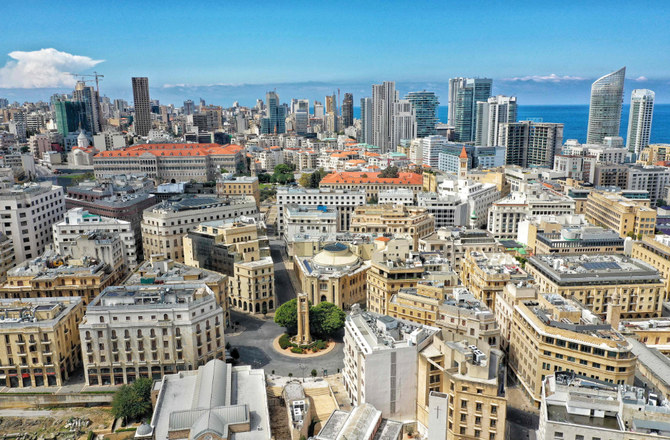Concern in Lebanon over judicial decisions targeting opponents of Hezbollah, Free Patriotic Movement

arabnews.com -- By Najia Houssari - BEIRUT: Lebanese media outlets expressed concern on Friday over creeping examples of “employing the judiciary for sectarian and electoral political goals.” It followed controversial Lebanese judge and Mount Lebanon state prosecutor Ghada Aoun’s fresh measures against the country’s embattled banking sector. Aoun issued a new decision on Thursday evening banning six banks from transferring funds abroad. The move coincided with the judiciary tightening the noose around the governor of the Banque du Liban, Riad Salameh. The first investigative judge in Mount Lebanon, Nicolas Mansour, summoned Salameh for a hearing next Thursday. The judge stressed that an arrest warrant would be issued against the central bank governor if he failed to attend the hearing.
Mansour also issued an adversarial arrest warrant against Salameh’s brother, Rajah Salameh, ordering he be kept in custody until next week based on charges of alleged illicit enrichment and money laundering. In response to Aoun’s recent decision, the Association of Banks in Lebanon said in a statement on Friday that such decisions showed a lack of knowledge of banking activity and its role in the national economy, and a complete disregard for the law. The statement said the judge’s decision could harm depositors who “will not obtain their rights once banks collapse and the country follows.” The association added: “The funds transferred by banks feed their accounts abroad, allowing them to fulfill their obligations, especially those resulting from opening credits for imports. “Preventing banks from transferring funds abroad leads to shutting down their accounts and preventing imports, directly affecting the banks’ local clients.”
By Sunniva Rose – thenationalnews.com — A Lebanese military court has charged Samir Geagea over the deadly violence in Beirut last October, …
by lb.usembassy.gov — In response to growing food security needs in Lebanon, the United States, through the U.S. Agency for International Development …

الحياةُ السياسيّةُ في لبنان مُكَلَّسةٌ. سكونُ قبورٍ من دونِ خشوعِ السَرْوِ. كلُّ خبرٍ يَزيدُ القرفَ والإحباط، وكلُّ موقفٍ يَفرِزُ مشاكلَ جديدةً لا حلولًا. كلّما تَكلّم مسؤولٌ جاوز خِطابُه الخِيانة. وكلمّا صَرّحَ بعضُ السياسيّين عانَقَت الشتيمةُ البَذاءةَ وحَضَنَ الانتقامُ الكراهيَة. الحكمةُ هَجَرت العقولَ والمحبّةُ القلوبَ، فوقَفَ الضميرُ حائرًا حيالَ مصيرِ الضمائر. حين يكــثُـــرُ السياسيّون تَقِلُّ السياسةُ ويَندُرُ رجالُ الدولة. وأساسًا نَفتقِدُ الدولةَ والرجال. في لبنان يوجدُ سياسيّون لكن لا تُوجد سياسة. ما نَظنُّه سياسةً هو مُتحوِّرٌ أفْرزَهُ الصَّدأُ السياسيُّ. هذا المتحَوِّرُ يُصيبُ المجتمعاتِ الوطنيّةَ التي لا تَتجَدّدُ ولا تَضع كِمامةً ضِدَّ من أساءَ إليها ورَعى انهيارَها.
بموازاةِ هذا الصدأِ، نَشهَدُ نزوحَ أحزابٍ وتيّاراتٍ لبنانيّةٍ عن ثوابِتها وحتّى عن وفائِها لتاريخِها ورموزِها، ونُبصِرُ ارتحالَ الأجيالِ الجديدةِ عن الأحزاب. في الهَجْرِ مُتعَةٌ. لكنْ، لا الأحزابُ عَثرَت على شعبيّةٍ بديلة، ولا الأجيالُ اللبنانيّةُ وَجَدت وجهةً أخرى. في الانتظار، لجأ الشبابُ إلى مجموعاتٍ وجمعيّاتٍ لا تَبتغي الربحَ (صارت تَبغي، وتَبتغي الربح) للمشاركةِ في الشأنِ العامّ. إنّه لجوءٌ موَقَّتٌ لا يَرقى إلى مرتبةِ الالتزامِ الوطنيِّ والوِجدانيّ، ولا يُغني عن أطرٍ سياسيّةٍ ثابتة.
هذه النزعةُ تؤثّرُ على انتظامِ الحياةِ الديمقراطيّةِ وعلى صدقيّةِ الانتخاباتِ النيابيّةِ. رغم ذلك لم نَـجِد بعدُ نظامًا أفضلَ من الديمقراطيّةِ لضمان الحريّات، ولم تَجد الديمقراطيّةُ آليّةً أفضلَ من الانتخاباتِ لتمثيلِ الشعب. بَيْدَ أنَّ الانتخاباتِ النيابيّةَ التي كانت شرطًا ضروريًّا وكافيًا لصُحّةِ التمثيلِ الشعبيّ، صارت اليومَ شرطًا ضروريًّا لكنّه غيرُ كافٍ. كلتاهما، الديمقراطيّةُ والانتخاباتُ، فَقدَت رونقَها. الديمقراطيّةُ تبدو ضعيفةً أمام أعدائِها، والانتخاباتُ تتحوّلُ من استحقاقٍ دستوريٍّ إلى مِهرجانٍ شَعبويّ. الانتخاباتُ قوّةُ الديمقراطيّةِ وضُعفُها. في الدولِ الديكتاتوريّةِ يَعتبرُ المواطنون أنْ لا فائدةَ من تصويتِهم، فالانتخاباتُ عَرْضٌ برتوكوليّ. وفي الدولِ الديمقراطيّةِ فَقدَ المواطنون نخوةَ التصويتِ وتلاشَت ثقتُهم بالسياسيّين.
Khazen History


Historical Feature:
Churches and Monasteries of the Khazen family

St. Anthony of Padua Church in Ballouneh
Mar Abda Church in Bakaatit Kanaan
Saint Michael Church in Bkaatouta
Saint Therese Church in Qolayaat
Saint Simeon Stylites (مار سمعان العامودي) Church In Ajaltoun
Virgin Mary Church (سيدة المعونات) in Sheilé
Assumption of Mary Church in Ballouneh
1 - The sword of the Maronite Prince
2 - LES KHAZEN CONSULS DE FRANCE
3 - LES MARONITES & LES KHAZEN
4 - LES MAAN & LES KHAZEN
5 - ORIGINE DE LA FAMILLE
Population Movements to Keserwan - The Khazens and The Maans
ما جاء عن الثورة في المقاطعة الكسروانية
ثورة أهالي كسروان على المشايخ الخوازنة وأسبابها
Origins of the "Prince of Maronite" Title
Growing diversity: the Khazin sheiks and the clergy in the first decades of the 18th century
Historical Members:
Barbar Beik El Khazen [English]
Patriach Toubia Kaiss El Khazen(Biography & Life Part1 Part2) (Arabic)
Patriach Youssef Dargham El Khazen (Cont'd)
Cheikh Bishara Jafal El Khazen
Patriarch Youssef Raji El Khazen
The Martyrs Cheikh Philippe & Cheikh Farid El Khazen
Cheikh Nawfal El Khazen (Consul De France)
Cheikh Hossun El Khazen (Consul De France)
Cheikh Abou-Nawfal El Khazen (Consul De France)
Cheikh Francis Abee Nader & his son Yousef
Cheikh Abou-Kanso El Khazen (Consul De France)
Cheikh Abou Nader El Khazen
Cheikh Chafic El Khazen
Cheikh Keserwan El Khazen
Cheikh Serhal El Khazen [English]
Cheikh Rafiq El Khazen [English]
Cheikh Hanna El Khazen
Cheikha Arzi El Khazen
Marie El Khazen